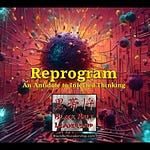It’s Thanksgiving here in the United States. This is a time set aside to reflect and be thankful for who and what we have in our lives. Thanksgiving is a day steeped in tradition and reflection. In keeping with this theme, I want to spend a few moments exploring the transformative power of gratitude not only in our lives but in the lives of others.
Here’s what I can tell you from personal experience…
When we embrace thankfulness as a daily practice, our lives are better for it. So why just set aside
“Thanksgiving is a unique tradition—a time when many of us gather with loved ones to celebrate the blessings in our lives. But today, I invite you to think beyond the turkey, dressing, and pumpkin pie, even though these are (to me) the three most important things on the Thanksgiving table. Instead, let’s reflect on what it means to live with gratitude.
Why is thankfulness so vital?
What can it do for our mental, emotional, and even our physical health?
These are the questions I want to answer in this week’s teaching.
But first, let’s take a quick look back at the origins of Thanksgiving.
Thanksgiving traces its origin back to 1621 when Pilgrims and Native Americans came together to celebrate a bountiful harvest. It was a powerful moment of connection, generosity, and gratitude, as they gave thanks to God for a successful corn harvest and the bonds of friendship that united two unique people groups.
While the circumstances were unique, the spirit of gratitude remains timeless. Today, we’re reminded of how gratitude can bridge divides and bring people closer together.
Gratitude is a uniter of people.
So why does gratitude matter? Let me share three reasons:
First, gratitude shifts our perspective. It helps us focus on what we have instead of dwelling on what we lack. It shifts our focus from scarcity to abundance, seeing the glass as half-full rather than half-empty.
It’s a powerful tool for building resilience.
Second, gratitude strengthens our relationships. When we express thankfulness to and for others, we deepen our connections and show how much we value those around us. When we value people, we look for opportunities to add value to them. When we add value to others, the relational bonds we share are strengthened.
Third, gratitude improves our health, emotionally mentally, and physically. Studies show that gratitude reduces stress, enhances mood, and even boosts the immune system. Those three outcomes alone are powerful reasons we need to develop an attitude of gratitude. After all, who doesn’t want less stress, to be more optimistic, and to enjoy the benefits of good health?
Gratitude isn’t just a feeling. We experience positive emotions when gratitude is expressed, but gratitude itself is an intentional act.
At its best, it is a way of living that benefits every aspect of our lives.
Let’s go a little deeper into the benefits.
Psychologically, gratitude increases happiness and life satisfaction. When we are grateful, we feel better about ourselves and others. Emotionally, it builds resilience and reduces negative feelings like envy, doubt, and depression. Socially, it strengthens our relationships, whether with family, friends, or teammates.
Even in the professional world, gratitude plays an important role. Teams that foster gratitude are more collaborative and productive. They get more things done because they focus more on what they can do together than the petty differences that could divide them.
Imagine the ripple effect of gratitude in every part of your life!”
But, what happens when we aren’t grateful?
When we are ungrateful or focus on what’s missing, we invite stress and dissatisfaction into our lives. Relationships can suffer, too, because unexpressed gratitude creates distance. Don’t miss this. Grateful teams are more collaborative and productive, both at home and in the workplace. An attitude of ingratitude is one of the fastest ways to self-sabotage your success, damaging and often destroying relationships in the process.
Also, don’t forget that ingratitude blinds us to the opportunities around us every day. It also prevents us from seeing and learning life’s lessons hidden in the challenges of life we face.
As Gertrude Stein once said, ‘Silent gratitude isn’t much use to anyone.’
Gratitude is meant to be shared, not held back.
But, there is good news:
Gratitude is a habit we can cultivate. Whether you’re a grateful person now or not, gratitude is a skill set you can improve upon. Good habits we’ve learned can be made better. Bad habits we’ve learned can be unlearned.
Here’s how you do that.
Start small.
Write down three things you’re grateful for each day in a journal. Or, take a moment to thank someone, whether through a heartfelt conversation, a note, or even a quick text. Make it a daily habit to thank three people or record three things you’re grateful for in a journal.
Better yet, do both of these daily.
Since this is Thanksgiving, let’s try a reflection exercise. Think about three things from this past year that you’re grateful for. Who supported you? Who served you in some way? Who showed up when you needed them to? How have you grown? What have you learned? How have you improved?
This is a wonderful exercise to do around the Thanksgiving table with family and friends, or anytime you’re with those who are important to you.
Mindfulness can help, too. Slow down and notice life’s small blessings—a smile, a kind gesture, or the beauty of nature.
Gratitude is everywhere when we look for it.
This Thanksgiving, I want to leave you with a challenge:
Let’s make gratitude a daily practice.
Let’s make every day a Thanksgiving Day.
Today, share what you’re thankful for with someone close to you. And tomorrow, find a new reason to be grateful, and share that with someone too. The next day, repeat the process.
Over time, you’ll see how this gratitude mindset can transform your life.
Thanksgiving reminds us to give thanks, but imagine the impact if every day felt like Thanksgiving.
Let me bring this lesson to a close so you can spend the rest of the day with family and friends.
An Attitude of Gratitude does three important things:
1. Gratitude shifts our perspective
2. Gratitude strengthens relationships, and \
3. Gratitude enriches our lives (and the lives of others) in countless ways.
I am truly grateful for each of you weekly tune not my podcast, read my newsletter, take one of my courses, invite me to train in our organization, or come to hear me speak at a conference or on a webinar.
Thank you for your friendship, encouragement, and support.
Thank you for making a positive difference in your local community.
And, thank you for learning, growing, and improving so you’re daily becoming a better version of who you are and what you do.
That’s what Black Belt Leaders do.
Let me close with this blessing:
‘May your hearts be full, your blessings overflow, and may you find gratitude in every moment.’
Happy Thanksgiving!
P.S. To help you create a daily ritual of Gratitude, I’ve created a new resource, “The Attitude of Gratitude.” You’ll find this (along with other resources) in the COURSES section of my website. It includes a Daily Gratitude Checklist, along with some additional insights into Gratitude.
You’ll also find a Gratitude Journal (Printable, or Fillable) that you can use to begin to cultivate an Attitude of Gratitude in your own life, and in the lives of others.












Share this post